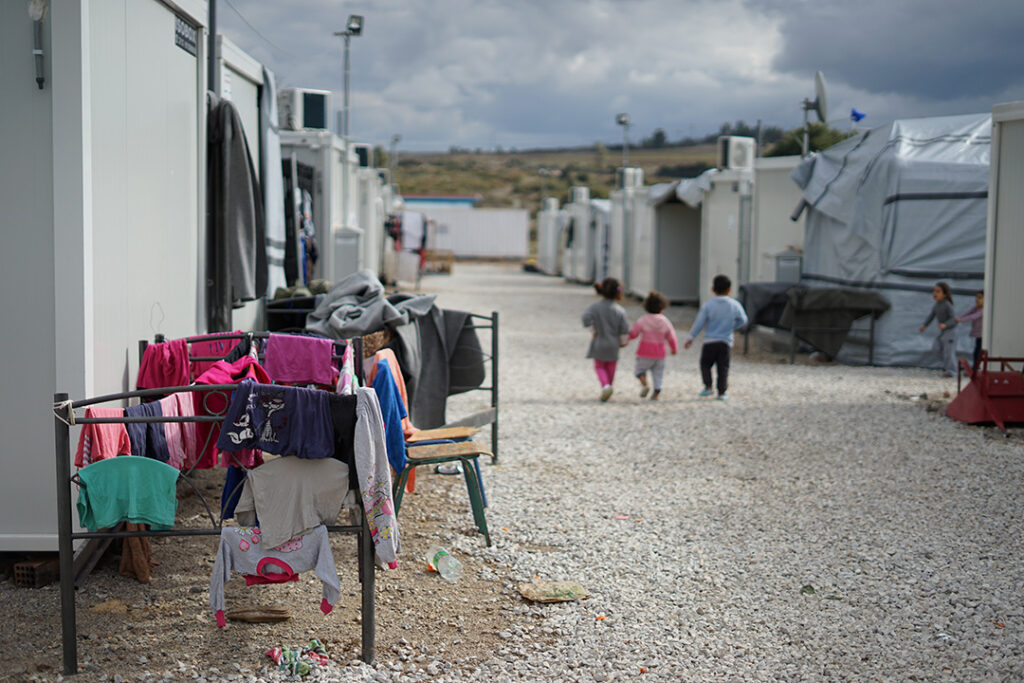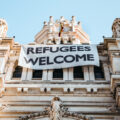Debordering solidarity: A Christian perspective on the refugee crisis in Europe
Debordering solidarity: A Christian perspective on the refugee crisis in Europe
Should we see the refugee crisis in Europe as a national security concern or a humanitarian emergency? Read about a Christian perspective on the issue here.
The refugee crisis in Europe
Violent conflicts and other emergencies have driven millions of refugees over the borders of their countries. Many of these vulnerable individuals are forced to undertake dangerous journeys across the sea in unreliable boats. Numerous shipwrecks and tragic deaths have occurred as a result. Recent flows of refugees have come to European countries from different parts of the world: Ukraine, Afghanistan, Congo, and other nations that are affected by conflicts or other crises.[1]
National security threat or humanitarian emergency?
The European media often portray refugees in a negative light. This is especially true for refugees with a non-Western cultural or ethnic background. While Ukrainian refugees are often treated as fellow Westerners, non-Western refugees tend to be perceived as outsiders. Moreover, media outlets often present refugees who do not have a Western background as cultural, economic, and security threats. Apart from this, these refugees tend to be associated with criminal or disruptive behaviour.[2]
A recent news item by the British Daily Mail, for example, associates refugees with “suspected terrorists” that “pose an active threat in the UK.” In the same vein, an article by The Telegraph links Albanian boat arrivals to “the threat to public safety” and refers to “violent criminals who shouldn’t even be here.”[3]
Whereas the media often portray refugees as a threat to national security, some organisations advance a kinder, more compassionate narrative. Rather than constructing the refugee crisis as a national security concern, they present it as a pressing humanitarian emergency. This humanitarian narrative does not frame refugees as threats or economic burdens, but as victims that require assistance and protection.
The Humanitarian Corridors Project
This narrative is characteristic of the Humanitarian Corridors Project, a mission driven by Christian ideals. The project was initiated in 2015 by a group of Christian organisations: the Community of Sant’Egidio, the Italian Federation of the Evangelical Churches, the Waldensian and Methodist Churches, and Diaconia Valdese. Its aim is to provide refugees with a safe alternative to the dangerous journeys that are involved in forced migration. The Humanitarian Corridors Project enables the safe and legal passage of refugees into a country where they can find safety.[4]
The organisations involved in the project have opened corridors to help refugees from Syria, Ethiopia, Eritrea, and various other countries. When they opened the second corridor, the Italian Bishops’ Conference, Caritas Italy, and the Migrantes Foundation joined. The project has since spread to several other European countries, including Germany, Belgium, Spain, and France.[5]
The Humanitarian Corridors Project
The Humanitarian Corridors Project relies on a narrative that is largely rooted in Christian ideals. A statement about the project by Eugenio Bernardini, representative of the Waldensian community, embodies several Christian values. Bernardini advocates a Christian ethic of suffering and compassion, as well as values of responsibility and service. He underscores our duty to help refugees by advocating the compassionate awareness of their suffering. Bernardini says,
“We are happy to have made our contribution and will take responsibility for these people, respecting their dignity – as we have continued to do for everyone, Italians included, for whom we have responsibility on a daily basis – as Christian churches in Europe generally do for everyone. Our priority is to help those who are in need and are suffering; everything else comes later.”[6]
Luca Maria Negro, president of the Federation of Evangelical Churches in Italy (FCEI), also uses words that reflect Christian ideals. His statement emphasises the Christian values of hospitality, solidarity, and charity:
“This is a church which welcomes. So we wrote in our Welcome Manifesto and so we have put this into practice. We are all strangers to someone else […] As Italian Christians, we love our neighbour and seek universal brotherhood and sisterhood.”[7]
In a speech about the Humanitarian Corridors Project, Pope Francis refers to the ideal of Christian unity:
“This service to the poor and to refugees and displaced people is also a powerful experience of Christian unity. In effect, the initiative of humanitarian corridors is ecumenical. It is an impressive sign of unity between brothers and sisters who share their faith in Christ.”[8]
National versus debordering solidarity
The Christian ideals that drive the Humanitarian Corridors Project relate to the idea of debordering solidarity. This concept refers to a sense of solidarity that overcomes national borders and challenges exclusionary practices. It implies a sense of common humanity, of togetherness in spite of differences.[9]
By advancing a narrative that gives expression to this ideal of debordering solidarity, the Humanitarian Corridors Project challenges the moral significance of borders. It objects to nationalist perspectives, which restrict the scope of morality to the national community. Instead, it develops a perspective that extends the scope of solidarity to the whole of humanity. The project hereby promotes a cosmopolitan language that stresses commonality rather than difference and portrays refugees as fellow human beings. This idea is evident when representatives speak of their commitment to “the salvation of migrants and the entire human family.”[10]
A Christian approach to the refugee crisis
The Humanitarian Corridors Project represents a Christian approach to the refugee crisis in Europe. By advancing a narrative of debordering solidarity, it challenges nationalist media frames that portray refugees negatively. Instead of presenting refugees as threats to the national community, this narrative portrays them as fellow human beings.
Want to learn more about similar topics? Explore the EARS Dashboard
Sources
[1] A Moment of Truth for Global Displacement
[3] Migrants demanding plush hotels are taking the taxpayer for fools
[4] The third way. Humanitarian corridors in peacetime as a (local) civil society response to a EU’s common failure
[5] The Necessity for Alternative Legal Pathways: The Best Practice of Humanitarian Corridors Opened by Private Sponsors in Italy
[6] “Humanitarian corridors” collaborators vow to continue welcoming ways
[7] “Humanitarian corridors” collaborators vow to continue welcoming ways
[8] “Humanitarian corridors are bridges of salvation and hope”
[9] Actions speak louder than claims: humanitarian corridors, civil society and asylum policies
[10] Humanitarian corridors: an ecumenical project to welcome and integrate






